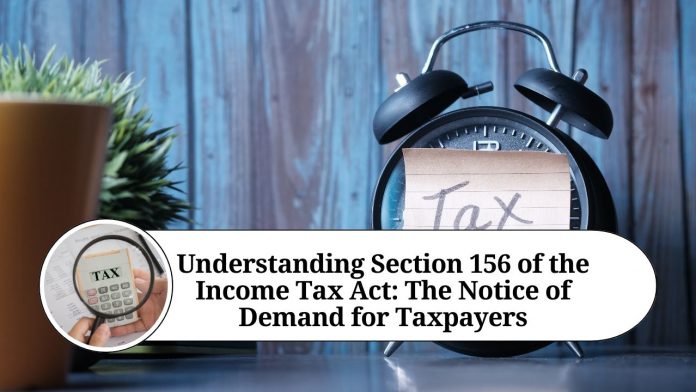The Income Tax Act is a comprehensive statute that governs the taxation of income in India. Section 156 of the Income Tax Act, 1961 deals with the notice of demand that is issued by the tax authorities to taxpayers who have outstanding tax liabilities.
The section states that when an assessment has been made under Section 143 or Section 144, or a reassessment has been made under Section 147 or Section 153A, the Assessing Officer shall issue a notice of demand to the taxpayer. The notice of demand specifies the amount of tax that is due and the date by which it must be paid.
The notice of demand is an important document that is issued by the tax authorities. It serves as a formal demand for payment of tax that is due and payable by the taxpayer. Failure to pay the tax within the specified time period can result in penalties and interest being imposed on the taxpayer.
The notice of demand must be served on the taxpayer in the prescribed manner. It can be served either by post or by delivering it to the taxpayer in person. If the taxpayer is not available at the time of delivery, the notice can be left at the taxpayer’s last known address.
If the taxpayer disputes the tax demand, he or she can file an appeal with the Commissioner of Income Tax (Appeals). The appeal must be filed within 30 days of the date of the notice of demand. If the Commissioner of Income Tax (Appeals) finds in favor of the taxpayer, the tax demand will be set aside.
In conclusion
Section 156 of the Income Tax Act is an important provision that deals with the notice of demand issued by the tax authorities. Taxpayers must ensure that they pay their tax liabilities on time to avoid penalties and interest being imposed on them. If a taxpayer disputes the tax demand, he or she can file an appeal with the Commissioner of Income Tax (Appeals).
Read more useful content:
- section 145 of income tax act
- section 10e of income tax act
- section 9 of the income tax act
- section 94b of income tax act
- section 206aa of income tax act
Frequently Asked Questions (FAQs)
Q: What is Section 156 of the Income Tax Act?
A: Section 156 of the Income Tax Act pertains to the notice of demand that is sent by the assessing officer to the taxpayer.
Q: When is a notice of demand sent under Section 156?
A: A notice of demand is sent when tax, interest, penalty or any other sum is payable by the taxpayer under the Income Tax Act.
Q: Can the taxpayer request for a rectification of demand under Section 156?
A: Yes, the taxpayer can file an application for rectification of demand under Section 156 if there is any mistake or error in the demand notice.
Q: What is the time limit for payment of the amount mentioned in the notice of demand?
A: The taxpayer is required to pay the amount mentioned in the notice of demand within 30 days of its receipt.
Q: What happens if the taxpayer fails to pay the amount mentioned in the notice of demand within the prescribed time limit?
A: If the taxpayer fails to pay the amount within the prescribed time limit, the assessing officer may initiate recovery proceedings under the Income Tax Act.
Q: Can the taxpayer file an appeal against the notice of demand issued under Section 156?
A: Yes, the taxpayer can file an appeal against the notice of demand under Section 156 by filing an appeal with the Commissioner of Income Tax (Appeals) within 30 days of receipt of the notice.
Q: Is it possible to seek an extension of time for payment of the amount mentioned in the notice of demand?
A: Yes, the taxpayer can make an application to the assessing officer for an extension of time for payment of the amount mentioned in the notice of demand.
Q: Is it mandatory for the assessing officer to issue a notice of demand under Section 156?
A: Yes, it is mandatory for the assessing officer to issue a notice of demand under Section 156 if any tax, interest, penalty or other sum is payable by the taxpayer.




















